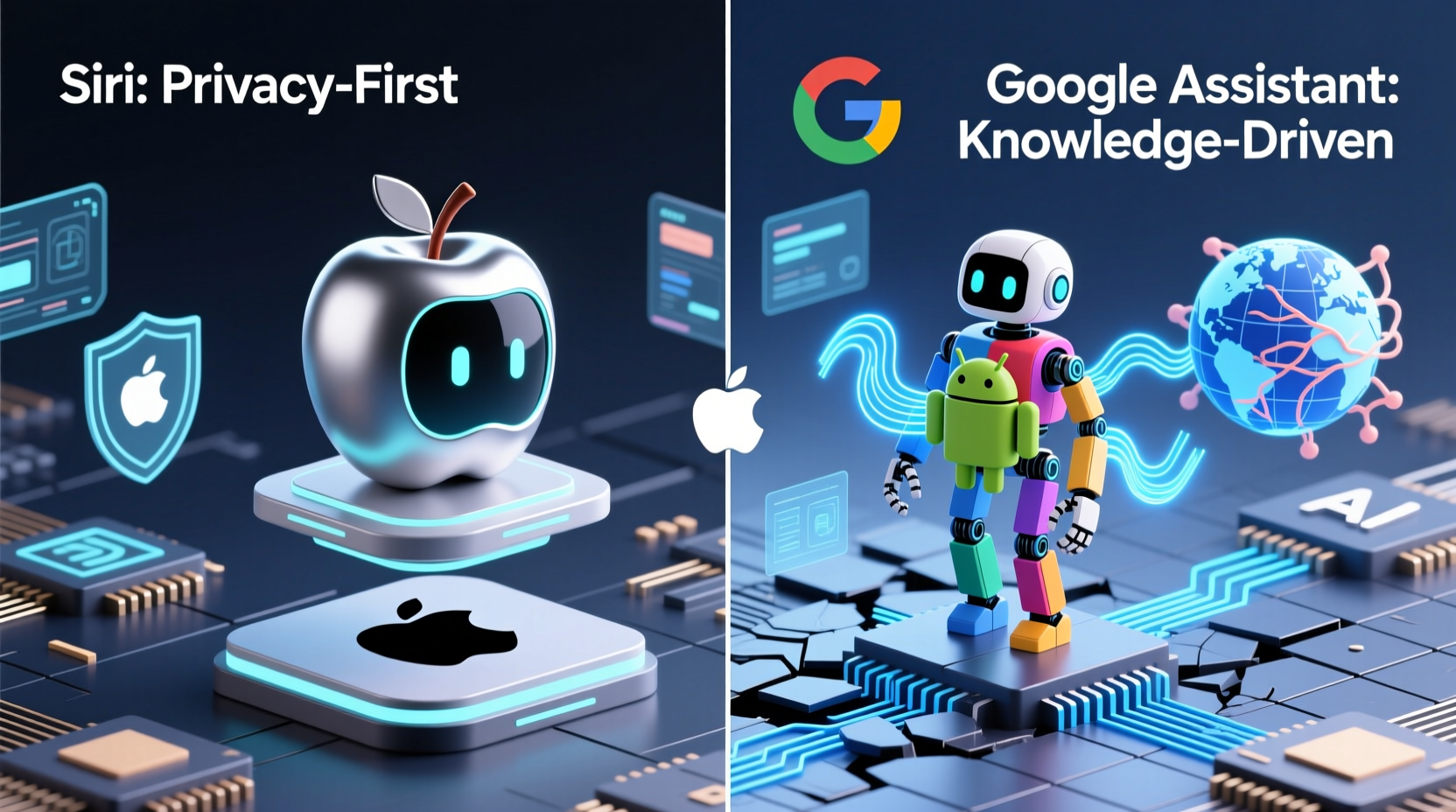For over a decade, Siri has been the face of Apple’s artificial intelligence ambitions. As the first mainstream voice assistant, it set the stage for how we interact with smartphones. But as Google Assistant evolved—leveraging Google’s vast data network and machine learning expertise—the gap in capabilities has become harder to ignore. Today, many users wonder: is Apple falling behind in the AI race, or does Siri still hold value in a tightly integrated ecosystem?
The answer isn’t binary. While Google Assistant often wins on raw functionality and contextual understanding, Siri compensates with privacy-first design and seamless device coordination. The real question isn’t just about features—it’s about what kind of user experience you prioritize.
Performance & Intelligence: Who Understands You Better?

When it comes to natural language processing and information retrieval, Google Assistant consistently outperforms Siri. This advantage stems from Google’s foundational strength in search and its ability to parse complex queries. Ask, “What’s the weather like during my trip to Lisbon next week?” and Google Assistant will check your calendar, extract travel dates, and deliver location-specific forecasts—all without follow-up questions.
Siri, by contrast, often requires more structured commands. It may ask for clarification or fail to connect disparate pieces of information unless explicitly guided. For example, asking Siri to “remind me about this email when I get home” works well within Apple’s ecosystem but struggles if context spans multiple platforms.
“Google’s dominance in search gives Assistant an inherent edge in knowledge and comprehension. Siri’s challenge is not just technical—it’s strategic.” — Dr. Lena Torres, AI Researcher at MIT Media Lab
This doesn’t mean Siri is incapable. It handles basic tasks—setting timers, sending messages, playing music—with speed and reliability. But when queries grow nuanced or require cross-service reasoning, Google Assistant adapts more fluidly.
Ecosystem Integration: Where Siri Still Shines
Apple’s greatest strength lies in its closed, cohesive ecosystem. Siri integrates deeply across iPhone, iPad, Mac, Apple Watch, HomePod, and even CarPlay. Commands like “Play that podcast on my HomePod” or “Unlock the front door with my Apple Watch” work effortlessly because every component is designed to communicate.
Google Assistant supports a broader range of third-party devices—smart lights, thermostats, TVs—but setup can be fragmented. Meanwhile, Apple’s HomeKit encrypts communications end-to-end, making it one of the most secure smart home platforms available.
If you’re invested in Apple hardware, switching to Google Assistant means sacrificing convenience for capability. Siri’s reliability within the ecosystem makes it hard to replace—even if it lags in conversational intelligence.
Privacy: The Silent Differentiator
One area where Siri clearly leads is privacy. Apple processes most voice requests on-device, minimizing data collection. When data is sent to servers, it’s anonymized and disassociated from your Apple ID. Google, meanwhile, uses voice interactions to refine user profiles for advertising and personalization.
This distinction matters. A 2023 Pew Research study found that 68% of smartphone users are concerned about voice assistants recording private conversations. Apple’s approach directly addresses these fears.
However, tighter privacy constraints limit Siri’s ability to learn from user behavior. Google Assistant improves over time by analyzing usage patterns; Siri cannot do so without compromising its privacy model. This trade-off defines each platform’s philosophy: Google optimizes for personalization, Apple for protection.
Feature Comparison: Siri vs Google Assistant at a Glance
| Feature | Siri | Google Assistant |
|---|---|---|
| Natural Language Understanding | Moderate – requires clear phrasing | Strong – handles ambiguity well |
| Cross-Device Sync | Excellent within Apple ecosystem | Good, but varies by manufacturer |
| Smart Home Control | Secure via HomeKit | Broad compatibility, less uniform security |
| Privacy Protection | On-device processing, minimal data retention | Data used for personalization and ads |
| Third-Party App Support | Limited (growing via SiriKit) | Extensive |
| Voice Recognition Accuracy | High for registered voices | Very high, adapts over time |
| Proactive Suggestions | Basic (e.g., commute time alerts) | Advanced (anticipates needs based on habits) |
Real-World Example: Two Users, Two Priorities
Consider two individuals: Maya, a digital marketer who travels frequently, and James, a privacy-conscious teacher using only Apple devices.
Maya relies on Google Assistant to manage her chaotic schedule. It reminds her to leave early for the airport based on traffic, books Ubers automatically after flights land, and pulls flight details from her Gmail. These proactive features save her time and reduce cognitive load.
James, however, values control over his data. He uses Siri to dictate journal entries, control his HomeKit-enabled lights, and set reminders—all without worrying about recordings being stored or analyzed. For him, Siri’s limitations are acceptable trade-offs for peace of mind.
Their experiences illustrate a key truth: the best assistant depends on lifestyle, values, and tech environment.
Is Apple Falling Behind?
In terms of AI innovation, yes—Apple has lagged. While competitors embraced large language models and multimodal AI earlier, Apple remained cautious. Siri’s architecture, built years ago, wasn’t designed for generative responses or deep contextual awareness.
But change is coming. With iOS 18 and the introduction of Apple Intelligence—a suite of on-device AI tools powered by generative models—Siri is poised for a major upgrade. Early demonstrations show improved understanding, visual interaction, and personalized assistance. Crucially, Apple promises these advances will maintain its privacy standards.
Still, catching up won’t be easy. Google has years of data refinement and infrastructure investment. Apple must prove its new AI can match utility without compromising its core principles.
Checklist: Should You Stick With Siri?
- ✅ You use multiple Apple devices daily
- ✅ Privacy is a top concern
- ✅ You rely on automation via Shortcuts
- ✅ You prefer simple, consistent commands over conversational flexibility
- ✅ You’re willing to wait for Apple Intelligence to mature
- ❌ You need advanced natural language understanding
- ❌ You use many third-party smart devices outside Apple’s ecosystem
- ❌ You want proactive suggestions based on behavioral data
Frequently Asked Questions
Can Siri work with non-Apple devices?
Limited support exists via Bluetooth or Wi-Fi, but full functionality requires Apple-certified accessories. For example, HomeKit allows certain third-party smart home devices to work with Siri, but compatibility is selective compared to Google Assistant.
Does Siri record everything I say?
No. Siri only activates when it hears “Hey Siri” or the side button is pressed. Recordings are not saved by default. Apple uses random, anonymized samples to improve accuracy, but users can opt out in settings.
Will Siri ever catch up to Google Assistant?
Potentially. With Apple Intelligence, Siri is gaining generative AI capabilities and deeper app integration. If Apple executes well, the gap could narrow significantly by 2025. However, matching Google’s cloud-powered adaptability remains a challenge.
Conclusion: Choose Based on Values, Not Just Features
The debate between Siri and Google Assistant isn’t just about who answers faster or understands better—it’s about what kind of relationship you want with technology. Google Assistant offers intelligence shaped by data, delivering uncanny usefulness at the cost of privacy. Siri offers reliability rooted in security, trading some smarts for control.
If you live inside Apple’s world and value discretion, Siri remains not just viable but optimal. For those seeking maximum functionality across diverse platforms, Google Assistant is the more capable tool. And with Apple’s upcoming AI overhaul, now might be the right time to reevaluate rather than abandon Siri altogether.









 浙公网安备
33010002000092号
浙公网安备
33010002000092号 浙B2-20120091-4
浙B2-20120091-4
Comments
No comments yet. Why don't you start the discussion?